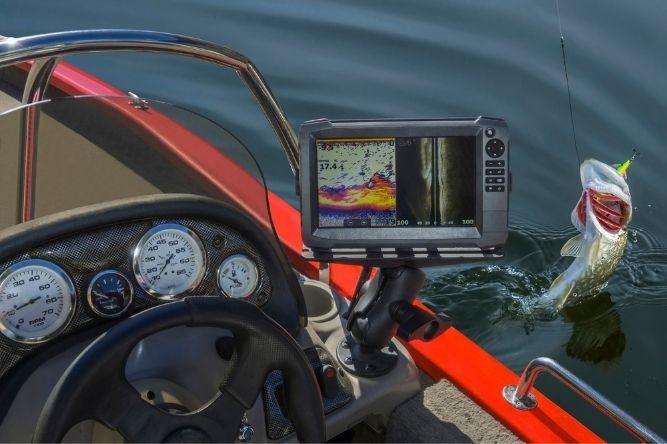
Fish finders are good at finding fish (it’s right there in the name) - but does the energy that fish finders emit scare fish away?
Let’s hope not. As we’ll discuss, if fish finders scared fish away, we’d have all kinds of problems - it would make our hobby a lot less enjoyable, and it would probably create food shortages around the world.
Those are some pretty dire consequences, so let’s start unpacking the myth that fish finders scare fish:
Fish finders, as you may know, are made up of two pieces of technology: the transducer, and the control head - which is sometimes just referred to as the fish finder. As far as we know, no one is worried about the control head - the screen and interface of the unit - scaring fish. (Though if you were to drop it in the water and scream about losing your expensive tech, it might scare a few anglers).
That means what we’re really focused on is the transducer. Your transducer emits sonar signals, more commonly referred to as pings or frequencies. This is what people are worried could scare fish - after all, sonar is sound used for detection.
There have been no long-term, peer-reviewed, double blind studies on whether or not sonar scares fish - at least, none that we’ve found. We can, however, use anecdotal evidence to try and divine whether or not fish are scared of the pings from your transducer.
Let’s start with exhibit A: commercial fishing. Commercial fishers use sonar technology - and a lot of it is more powerful than the stuff us hobbyists use.
About 3 billion people rely on fish as their primary source of protein. If sonar scared off more fish than it helped find, the fishing industry would be likely to drop it entirely. Instead, more sophisticated and more powerful sonar technology is being developed as you read this.
That’s because, even if sonar does scare off fish (and there’s no evidence that it does), it does an excellent job of helping commercial fishers catch those fish.
Commercial fishing happens out in the ocean, though - what about fishing in shallow water? When you’re fishing in 10 feet of water, is it possible that the noise becomes loud enough that fish shy away?
Anecdotally, no - plenty of anglers have done plenty of shallow water fishing using their fish finders, and very few report problems. Some anglers are convinced that sonar scares off the fish, however.
We point you, then, to a short YouTube video by GC Jetski Fishing entitled: “Do fish finders scare fish away? TESTED!”. He does a simple test: he uses a transducer over top of his aquarium to see if it scares the fish.
The long and short for those who don’t want to watch? He busts the myth in about one foot of water. For a moment, the fish seem to back away from the sound, but within seconds, they’re swimming as though nothing had happened. That means a fish in very shallow water may back away, but it’s more than likely that they’ll come back.
And that’s in just a foot of water. In 10 or more feet? The sound of the sonar probably won’t bother fish much at all.
With that in mind, when you’re looking through our fish finder reviews for shallow water, don’t go for less powerful - the evidence points to fish not getting scared by fish finders.
Instead, opt for units with a high degree of control over interference rejection, as well as units with higher frequencies. Depth penetration isn’t as important in shallow water fishing, so we recommend getting the best target separation that you can - 800 kHz or more with CHIRP sonar should do the trick.
Happy fishing!